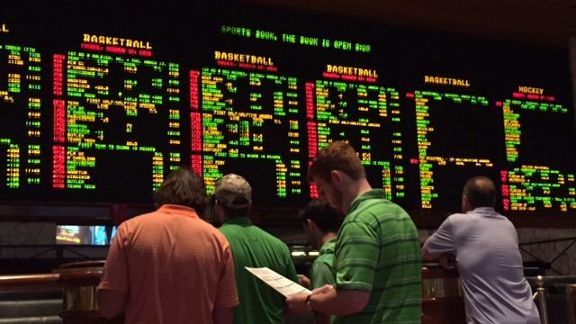The sports television industry is struggling. There is an onslaught of competition from streaming services, video games, social networks and mobile phones. Fans can’t see the vast majority of games without an expensive cable subscription, and millions are opting to “cut the cord” or never install one. Rights costs are increasing while ratings are decreasing. Viewers are getting older. The advertising outlook is grim.
But the Supreme Court injected a dose of optimism into the industry when it ruled Monday to strike down a 26-year-old federal law that largely prohibited sports betting in the United States. The ruling is likely to produce the next major boost to the value of live, televised sports, industry executives and experts say, at just the time when it is most needed.
Nearly everyone agrees the appetite for sports consumption both online and on traditional television will surely rise, as more fans might suddenly have a vested interest in tuning in to a Tuesday night matchup in June between the Cincinnati Reds and the Miami Marlins. History has shown that the ability to place a bet on a sporting event makes fans pay closer attention to the action, and watch more.
According to a Nielsen Sports study, commissioned by the American Gaming Association, sports bettors made up 25 percent of the N.F.L.’s television audience in 2015 but accounted for 47 percent of all minutes viewed. Sports bettors watch about twice as much sports coverage as non-bettors do. So it stands to reason that making it easier for people to become sports bettors will make them more likely to watch sports.
“Hands down, it’s a huge deal,” said Brad Humphreys, a sports economist at West Virginia University. “How huge it is depends upon how quickly states move and how many states move to legalize sports betting.”
The eventual size of the legalized sports betting industry in the United States is anyone’s guess. Almost $5 billion was bet on sports in Nevada last year, but that figure is dwarfed by the amount bet on the illegal betting market, which is estimated to be anywhere from tens to hundreds of billions of dollars.
In Britain, home to just 65 million people and a far less-diverse sports market, bettors wagered nearly $20 billion for the fiscal year ending in March 2017, the last year for which figures are available, according to a report from that country’s Gambling Commision.
The revenue generated from that betting quickly finds its way into the pockets of sports broadcasters, as well as leagues and teams. British betting companies are estimated to put 20 to 30 percent of revenue back into advertising, mostly on television.
Consider, for example, Bet365, one of Britain’s largest bookmakers, which generated $3 billion in revenue (and $666 million in profit) for the fiscal year ending in March 2017. In addition to spending hundreds of millions of dollars on media advertising, the company also has had a sponsorship with the soccer club Stoke City, which was recently relegated from the Premier League but had the Bet365 name on its jerseys and stadium.
“If Bet365 invest 25 percent of their revenue back into sports, that’s $700 million per year” said Laila Mintas, the deputy president of Sportradar, a sports data company that distributes instant statistics and other information for professional sports. “You can imagine what that means.”
Even less high-profile events are likely to see a boost in interest. That would likely benefit ESPN, which recently introduced ESPN+, the company’s long-awaited sports streaming service, that will feature thousands of live games and original programming for $4.99 a month. The company hasn’t solidified its plans to produce shows that target sports betting fans, but Connor Schell, ESPN’s executive vice president for content said Tuesday that such programming has been on the ESPN+ “content road map” from the beginning.
“We’ve thought about betting and the conversation around betting in line with what Doug Kezirian is doing on the ‘Behind the Bets’ podcast,” Schell said after the network’s annual presentation to advertisers in New York City on Tuesday.
The longtime ABC and ESPN broadcaster Brent Musburger, who was known for making sly betting references on-air, retired last year and co-founded Vegas Stats & Information Network. The network streams 12 hours of betting-focused video a day, which is simulcast on Sirius radio.
Joe Asher, the chief executive of William Hill US, a bookmaker, cautioned that it might take a few years for the big advertising money to find its way to national channels like ESPN, Fox and NBC, as states need to go through the legislative process to legalize and regulate sports betting.
“It’s hard to see the national advertising being effective now, when you are dealing with a finite number of states,” he said.
Targeted advertising on regional sports networks in states where gambling becomes legal first seems more likely.







